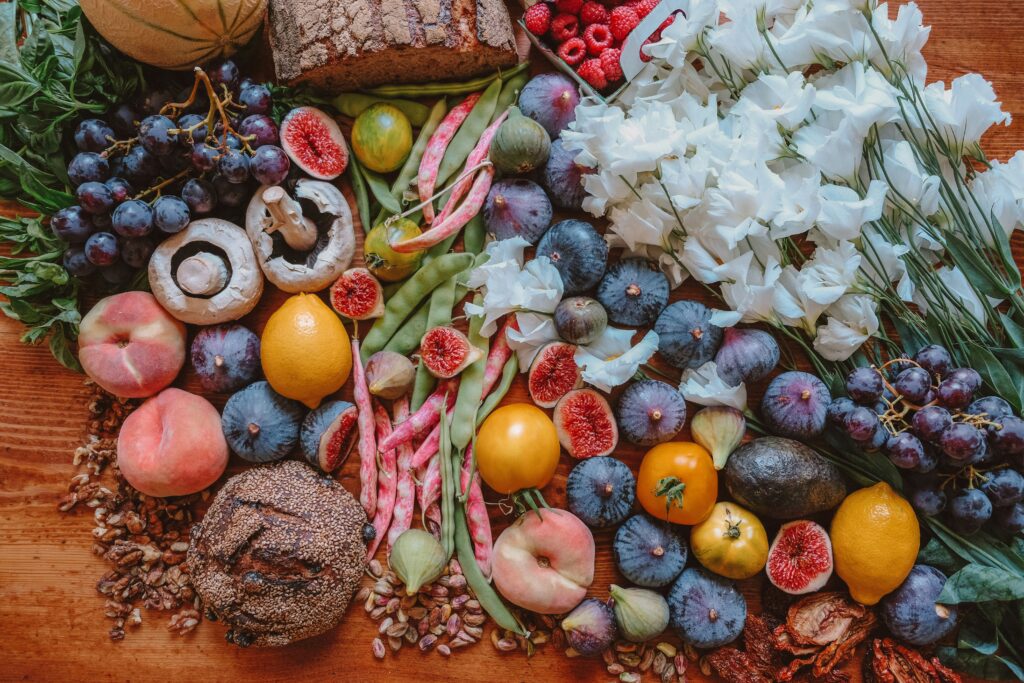The human gut is home to a bustling community of trillions of microorganisms, collectively known as the gut microbiome.
These tiny inhabitants play a massive role in our overall health, influencing everything from digestion to immunity and even mental well-being.
But what keeps this complex ecosystem thriving? The answer lies in dietary diversity. A varied diet packed with nutrient-dense, fiber-rich foods provides the fuel your gut bacteria need to flourish.
We’ll explore why gut bacteria crave diversity, how your diet impacts your microbiome, and how you can support your gut health for optimum wellness.

Image by Unsplash
Understanding the Gut Microbiome
The gut microbiome is composed of trillions of bacteria, fungi, viruses, and other microbes. These organisms live primarily in the large intestine and perform vital functions such as breaking down food, producing essential nutrients, and regulating the immune system. A healthy microbiome is marked by diversity—a wide range of beneficial bacteria working together to keep your body in balance.
However, this delicate ecosystem is influenced by various factors, including diet, lifestyle, stress, and antibiotic use. Among these, diet is one of the most significant contributors to microbiome diversity. Research consistently shows that what you eat directly affects the composition and activity of your gut bacteria.
Why Diversity Matters for Gut Bacteria?
A diverse gut microbiome is a hallmark of good health. Studies have found that people with a greater variety of gut bacteria are less likely to suffer from chronic diseases such as obesity, type 2 diabetes, and inflammatory bowel disease. Conversely, a lack of microbial diversity is often linked to health problems, including:
- Digestive Issues: Low diversity can lead to imbalances, causing bloating, constipation, or diarrhea.
- Weakened Immunity: A less diverse microbiome may impair the body’s ability to fight infections.
- Mental Health Disorders: Emerging research connects poor gut health to conditions like anxiety and depression.
How Diet Impacts Gut Microbiome Diversity
The foods you eat provide the building blocks for your gut bacteria to grow and thrive. Certain foods are especially beneficial for promoting microbial diversity:
1. Plant-Based Foods
Fiber is the primary fuel for gut bacteria. Foods like fruits, vegetables, whole grains, and legumes are rich in diverse types of fiber that nourish different bacterial species.
2. Prebiotics
Prebiotics are compounds that feed beneficial bacteria. They are found in foods like garlic, onions, bananas, and asparagus.
3. Probiotics
Probiotics are live beneficial bacteria found in fermented foods like yogurt, kimchi, and sauerkraut. Incorporating these foods can help introduce new bacterial strains to your microbiome.
Scientific Evidence Supporting a Diverse Diet
Research provides compelling evidence for the link between dietary diversity and gut health. The American Gut Project, one of the largest studies on the human microbiome, found that people who ate at least 30 different types of plants per week had significantly more diverse gut bacteria compared to those who ate fewer than 10 types.
This diversity was associated with better health outcomes, including lower inflammation levels and improved digestion.
Tips for Cultivating a Gut-Friendly, Diverse Diet
Increasing your dietary diversity doesn’t have to be complicated. Here are some practical tips:
- Eat the Rainbow Incorporate a variety of colorful fruits and vegetables into your meals. For example, mix spinach, carrots, bell peppers, and beets into a single salad.
- Experiment with Global Cuisines Try dishes from different cultures, such as Indian dal (lentil curry), Mediterranean tabbouleh, or Korean kimchi.
- Include Fermented Foods Add yogurt, kefir, miso, or tempeh to your diet for a natural source of probiotics.
- Don’t Forget Whole Grains Swap refined grains for whole grains like quinoa, farro, and bulgur, which provide more fiber.
Meal Idea: Start your day with a bowl of oatmeal topped with berries, nuts, chia seeds, and a dollop of yogurt. This breakfast packs a variety of fibers and probiotics to kickstart your gut health.
The Connection Between Gut Health and Mental Well-being
The gut-brain axis is a communication network linking your gut and brain. A diverse microbiome plays a crucial role in producing neurotransmitters like serotonin, which influence mood and cognition.
Studies suggest that improving gut health can alleviate symptoms of anxiety and depression. For example, a 2020 study found that probiotics reduced depressive symptoms in participants.
Modern Challenges to Gut Health
Today’s diets often lack the variety needed to support a thriving microbiome. Processed foods, high sugar intake, and antibiotic use can deplete beneficial bacteria and reduce diversity. Combat these challenges by prioritizing whole, unprocessed foods and limiting antibiotics unless necessary.
Your gut bacteria thrive on diversity, and so does your health.
By eating a wide range of fiber-rich, plant-based, and fermented foods, you can cultivate a robust and diverse microbiome that supports your digestion, immunity, and even mental well-being. Start small by introducing one or two new plant-based foods to your meals each week.
Over time, these changes can have a profound impact on your health. Remember, every bite is an opportunity to nourish not just yourself but the trillions of tiny allies in your gut.









